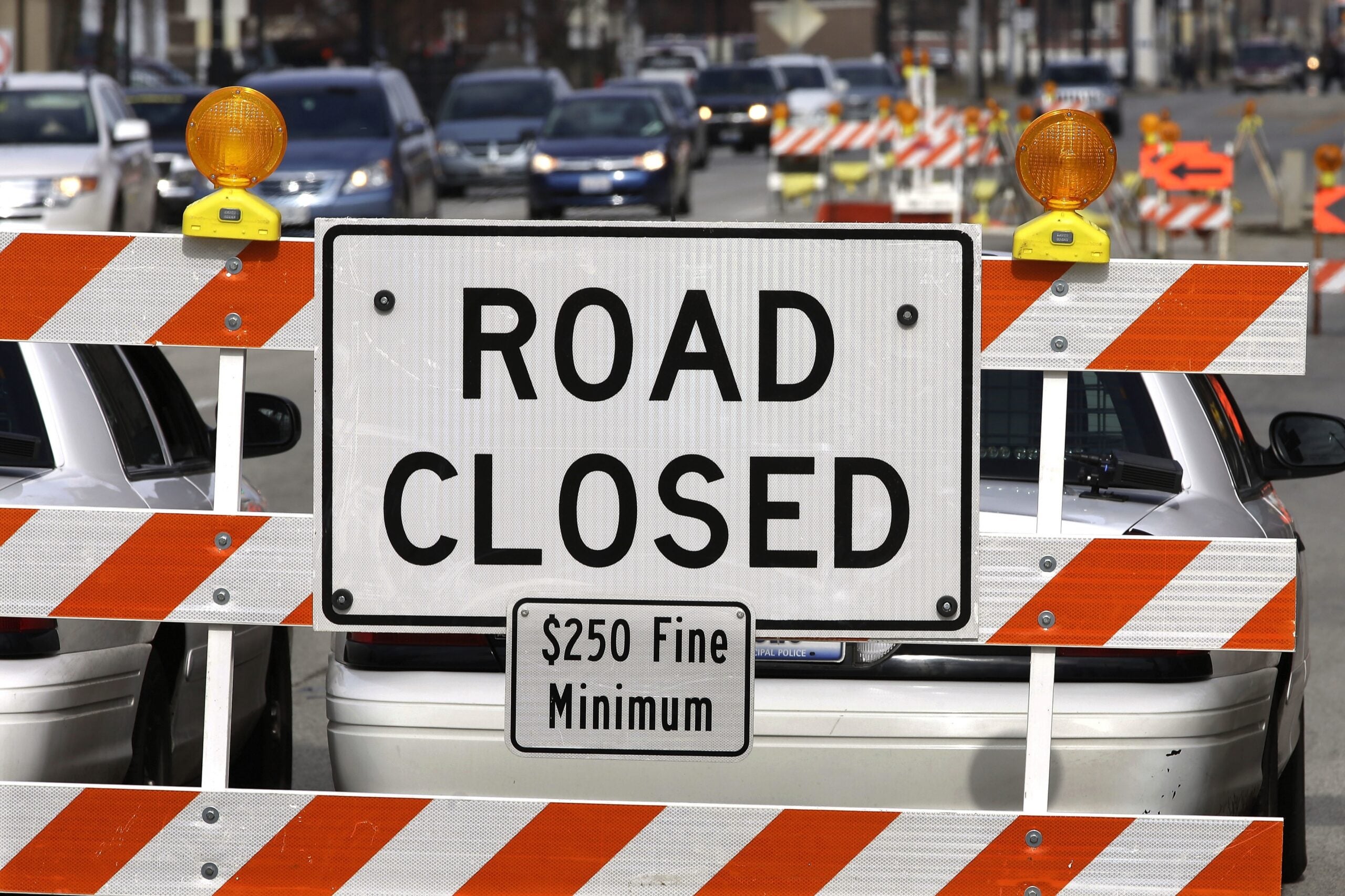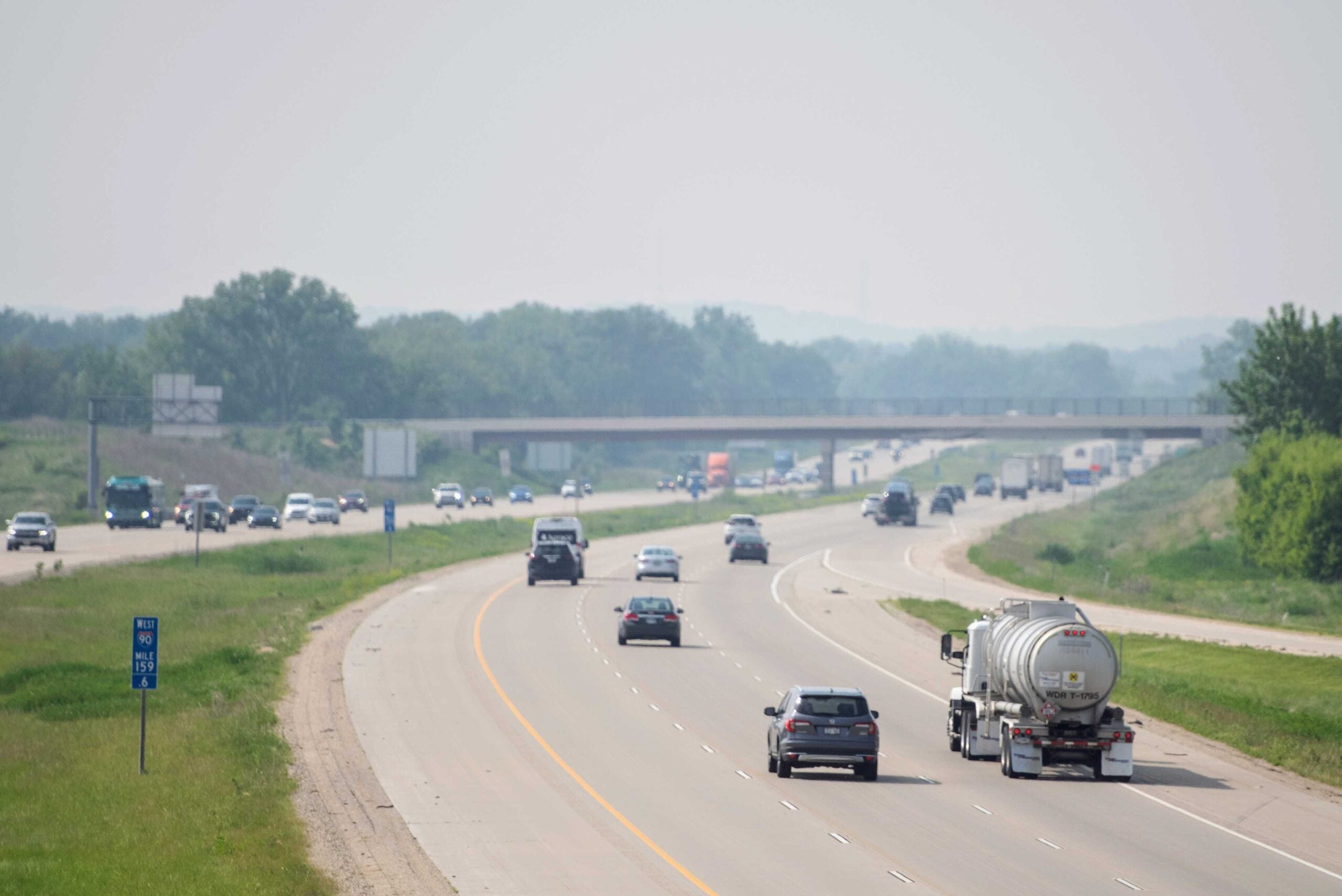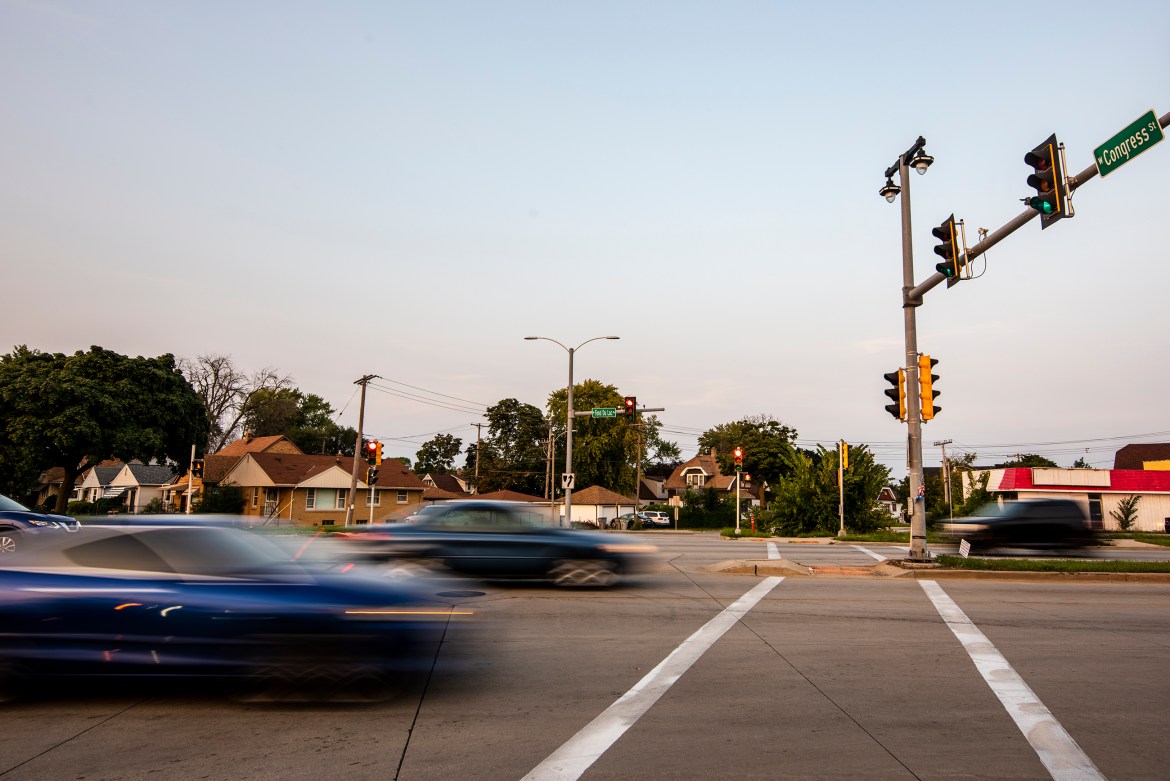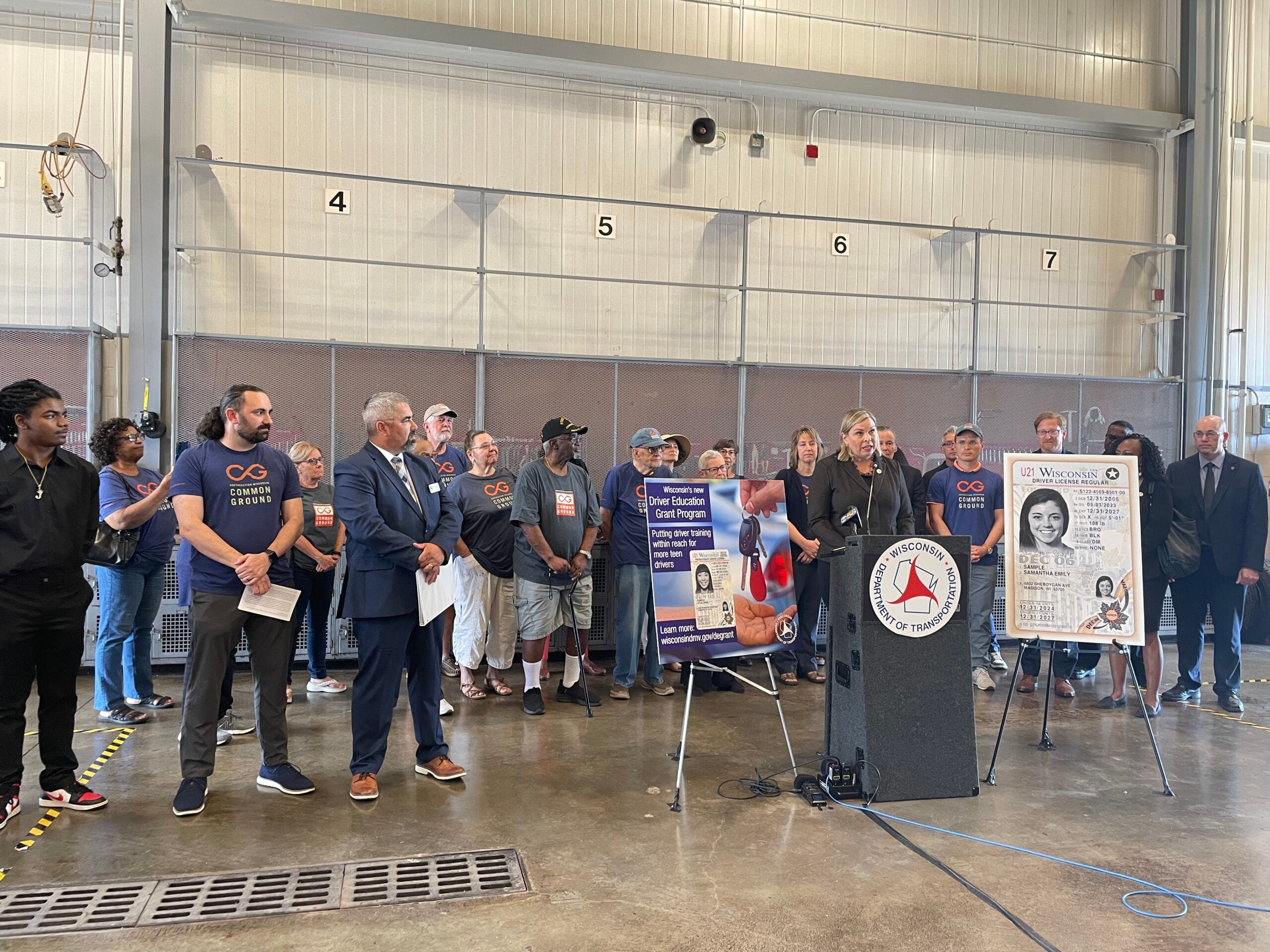Republicans on the Legislature’s budget committee voted Thursday night to increase vehicle title fees by $95 and registration fees by $10 to generate hundreds of millions for Wisconsin road projects in the next state budget.
Altogether, the moves would generate $393 million in new revenue for transportation, a total about $200 million less than Gov. Tony Evers wanted, but more than in any budget signed by former Republican Gov. Scott Walker. Republicans would also use another $90 million from the state’s general fund to pay for road projects, bringing the total new funding to $484 million.
“In general we’re listening to our constituents who all over this state said, ‘Fix these damn roads,’” said Sen. Alberta Darling, R-River Hills. “They feel like their roads are deteriorating, and they want us to address rehab.”
News with a little more humanity
WPR’s “Wisconsin Today” newsletter keeps you connected to the state you love without feeling overwhelmed. No paywall. No agenda. No corporate filter.
Darling’s comments echoed a refrain made frequently by Evers, who wanted to increase transportation revenue by roughly $600 million over the next two years.
Evers proposed an eight-cent increase in the gas tax, which is the largest source of funding for Wisconsin’s roads. He also called for a return of what’s known as “gas tax indexing,” which would automatically raise the gas tax in future budgets to keep pace with inflation. Those changes combined would have increased the state’s share of the gas tax to 42.5 cents per gallon in 2021 and generated about $527 million for state government.
Evers also called for increasing fees on heavy trucks, which do the most damage to Wisconsin roads, which would have generated about $72 million.
Republicans rejected the gas tax increase and the fee on heavy trucks. Instead, they voted to raise the current vehicle registration fee from $75 to $85 per year and increase the vehicle title fee from $69.50 to $164.50 — an increase of 137 percent.
“This is a 137 percent increase on the tax when you buy a car,” said Rep. Evan Goyke, D-Milwaukee. “You can call it a ‘fee’ and hide behind the word but it costs just the same.”
Democrats argued Evers’ plan to raise the gas tax instead of title and registration fees was the better approach because it would be paid by everyone who uses Wisconsin’s roads, not just Wisconsin residents.
Sen. Jon Erpenbach, D-West Point, said raising vehicle fees instead of the gas tax “absolutely lets out-of-state drivers coming through Wisconsin completely off the hook.”
“They use our roads, they should help pay for our roads,” Erpenbach said.
In addition to the new fees, Republicans would use $90 million in general fund money to pay for local road projects in counties, towns and municipalities. The general fund pays for expenses like schools and Medicaid, but over the past 16 years, the Legislature’s nonpartisan budget office says there’s been a net transfer of $900 million out of the general fund to pay for roads.
Republicans would also borrow about $326 million for roads, which is in line with what Evers wanted and would be the lowest levels of bonding in years. They would also fund road projects in the current budget at roughly the same level as the governor.
A Thorny Issue
Transportation has long been a thorny issue in Wisconsin, especially for Republicans who’ve controlled the state Legislature since they were swept into power in the 2010 election.
In the 2011 state budget, Republicans commissioned a study that explored long-term answers to road funding. The final report suggested a variety of options for increasing revenue, from raising the gas tax, to a mileage-based vehicle registration. None of the ideas were adopted.
In the 2015 budget, Republicans ordered another study of road funding. That report also suggested options like raising the gas tax or vehicle registration fees. Again, the ideas were rejected.
Republican lawmakers called for yet another transportation study in the 2017 budget, although this one could have been more consequential. It would have spent $2.5 million to implement toll roads in Wisconsin. Walker vetoed the study at the request of a group of state Senate Republicans.
The budget motion approved Thursday includes a new $2.5 million study, this one to explore “mileage-based fees.” While that could mean mileage-based vehicle registration fees, the Legislative Fiscal Bureau said the term is generic enough that it could refer to tolling.
Under the new study, the state Department of Transportation would be required to make a recommendation on its findings to the Legislature’s budget committee by January 1, 2023, right before Evers’ first term ends. The budget committee — not the full Legislature — would be required to vote on it.
“We have imperfect options in front of us,” said Rep. Shannon Zimmerman, R-River Falls. “We have to dig in one more time and take a good hard look at this.”
While Republicans fought publicly over road funding two years ago, Assembly Speaker Robin Vos, R-Rochester, and Sen. Majority Leader Scott Fitzgerald, R-Juneau, issued a joint statement last night praising the GOP transportation plan.
Other Republicans were less thrilled.
Sen. Duey Stroebel, R-Saukville, was the lone Republican member of the budget committee to vote against the plan. Stroebel has long been critical of the DOT, including Transportation Secretary Craig Thompson, who previously ran the Transportation Development Association of Wisconsin.
“I don’t have a lot of faith in our transportation secretary, who used to be a road builder lobbyist,” Stroebel said to reporters after his vote.
State Sen. Steve Nass, R-Whitewater, who is not on the budget committee, said in a statement that the vehicle fee increases were among factors “jeopardizing (his) support” for the budget.
“Tonight is a big win for the road building special interests and a big loss for the taxpayers,” Nass said in a statement.
Republicans hold a 19-14 majority in the Senate, meaning they can afford to lose two GOP votes in that chamber and still pass the budget.
The final say on the budget would be up to the governor. Evers spokeswoman Melissa Baldauff issued a statement Thursday night saying Republicans were still “struggling” to find a sustainable solution to transportation funding.
“Raiding our state coffers and making Wisconsinites foot the bill for the rest instead of making out-of-state drivers pay their fair share isn’t the long-term solution Wisconsinites are asking for,” Baldauff said.
Evers has not ruled out vetoing the entire budget, something the nonpartisan Legislative Reference Bureau says hasn’t happened in Wisconsin dating back to at least 1931.
Other provisions included in the GOP transportation plan had little to do with road funding.
One would prevent the state from spending more on security for Wisconsin’s Lieutenant Governor in the next budget than it has in the current budget. The plan is directed at Democratic Lt. Gov. Mandela Barnes, whose security costs have been considerably higher than those of his predecessor, former Lt. Gov. Rebecca Kleefisch. Barnes is the first African American to hold the office. His former aide, Brandon Weathersby, said Thursday that Barnes regularly received “hateful” messages when he was a state lawmaker and suggested those instances would have increased with his higher profile office.
The GOP transportation motion also included a provision that would curb the ability of local governments to regulate quarries. GOP lawmakers included a similar provision in the last budget, only to see it vetoed by Walker.
Wisconsin Public Radio, © Copyright 2025, Board of Regents of the University of Wisconsin System and Wisconsin Educational Communications Board.







